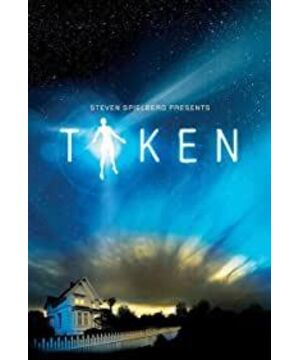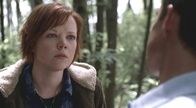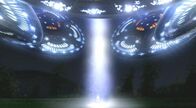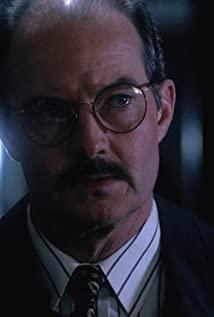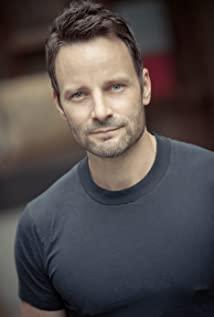The biggest selling point of this TV series is Spielberg, who is the producer.
As we all know, the Hollywood commercial film giant has always had a "World War II complex" and "Alien complex", and this 10-episode TV series is just after he and Tom Hanks collaborated on the World War II TV series [Band of Brothers]. The latest TV work developed. To a certain extent, this "long-form film" that runs through the 50-year history of the United States is a continuation and supplement to [Band of Brothers]. Of course, this is also likely just a coincidence.
Spielberg's films about aliens are probably [ET], [Third Contact] and [AI]. They have their own emphasis on the exploration of alien creatures and the mysteries of the universe, but there is also a The common denominator is the inability to break away from the theme of family-centered self-compassion. The director and screenwriter of the TV series [UFO] are not Spielberg himself, but this spirit obviously greatly infected the creative mentality of the screenwriter and 10 directors of this film.
The Chinese name [UFO] obviously comes from the transliteration of "UFO", in fact its English name "TAKEN" in this film most accurately means "hijacking". One of the most obvious historical events involved in the film is the "alien abduction incident" that was widely circulated in the United States in the 1960s, which is the basis of this story.
I liked the first half of this story very much. Although I later found out that the first five episodes of the history of the three families from the 1950s to the 1980s are actually a bit redundant, or a little long and procrastinated, the American history restored by the film is very realistic and has a kind of Fascinating nostalgia. Such as clunky and graceful Fords, cozy country vibes and a slightly restless but vibrant small-town vibe. They allow people to appreciate the 50-year evolution of contemporary American culture while watching this TV series, especially behind the progress of the years, people's lives have gradually shifted from the countryside to the town, and then to the metropolis. , with a rich and clear historical texture. This close integration of American history in the first half of the film successfully sets off the atmosphere of the times, but lacks dramatic conflict, so it may be a torture to those who like fast-paced, thrilling audiences. This situation began to change in the sixth episode. In the 1990s, with the birth of the fourth generation of Ellie (this little girl is the central character of the story) of three families, the drama of the story began to expand, and many of the previously set The suspense was also pushed aside one by one, and the story became full of tension. But I personally feel that the last five episodes of "Being Good" are not as successful as the first half.
Let me tell you the story first to help you understand -
the film begins on the eve of the end of World War II. During a US-German air battle, the wounded air force captain and his pilot suddenly disappeared in the air. Two days later, these 9 people appeared in France. Unscathed, they claim to have seen an unusual blue light. Soon after the war ended, they were discharged from the army and returned to the United States, but after that, eight of the captain's comrades died inexplicably one after another. Although the captain himself married and had children safely, he was also in a state of high panic and schizophrenia for a long time, and he insisted that he was abducted by aliens from time to time. Since then, the descendants of this family (all men with strong personalities) began to be "abducted by aliens TAKEN", and this experience became a nightmare that this family could not escape.
In the 1950s, a flying saucer suddenly fell into the territory of Texas. The first officer to arrive was an ambitious young man. In order to gain command of the research work, he married the daughter of the colonel in charge and killed the woman he had an affair with. He was given command to lead the alien research project, and at the same time, he obtained and hid a fragment of a flying saucer from the slain woman. The young officer became the source of an evil family that researched, explored, and seized the secrets of UFOs, and his ambitious descendants were each ruthless and cruel.
There are 5 aliens on the flying saucer that fell in Texas, three of them died when the flying saucer fell, one died at the US military base, and the survivors changed into humanoids and came to a farm. He and the hostess of the farm left in a hurry, and buried the mysterious genes of aliens in their descendants. This family is destined to undertake a huge historical mission.
In the following 50 years, the three families seemed to be fulfilling some kind of destiny, and the descendants of the kidnapped families were always repeatedly hijacked. Their heroic resistance was almost meaningless, and the military was ruthless except using them to find alien creatures. persecute their flesh without sympathy. The evil military clan also seems to have an unfortunate fate, that they must (necessarily) kill their relatives, especially the father who holds the power and power, in order to gain command of the alien research project. There was also an upright young man in this family. He was a boy who studied journalism, but was burned to death in the Alaska forest. His brother was also there at the time, but he left silently with a cold face. Most of the heirs of alien descendant families have some kind of "special function" that surpasses mortals, but every time they use this function to rescue their family, they will consume energy, which is similar to the battery in their body. lead to death.
In the early 1990s, the boy of the kidnapped family and the girl of the alien family had a relationship inside a flying saucer without knowing it, so the girl gave birth to a child without being married and without knowing who the father was. Girl, she's "Allie" (the plot is like Maria giving birth to Jesus as a daughter, mysterious and ridiculous). Ellie is a mysterious girl, she has been writing a diary since she was three years old, and her thoughts on life are often full of philosophical and speculative colors, and her conversations with adults often make those who are full of psychological shadows and scars. Adults" get spiritual comfort. In fact, she is the presenter for the entire film, and the voiceover throughout the film is her dictation. This is a very beautiful girl, kind of like a child's version of Jodie Foster in temperament, and her status and cuteness are no less than Drew Barrymore in [ET].
In episode 7, the film gradually unveiled her mystery. This girl with extraordinary superpowers can control time, easily remove a large group of people, heal fatal gunshot wounds, and even more unimaginable, she can also create realistic illusions, making people believe that she has seen dead parents and children, and falling saucers. And for 50 years, all the purpose of alien creatures waiting to linger on Earth is to "create" this perfect experiment. It turned out that for 50 years, the reproduction and selection of several families was a genetic experiment by aliens. Facing alien creatures higher than human civilization, loving her parents deeply, and the American military who want to seize the secrets of aliens, Ellie must make a choice. Although at this time, the alien representative (Ellie's grandfather) felt pity because of the emotional power of human beings, and he gave Ellie the opportunity to choose independently, but the stupid military (actually represents the evil and greed of human beings) ) or force her to leave Earth. U.S. citizens, who have been plagued by "alien abductions" for decades, witness the astonishing sight of a giant spaceship taking Ellie away as it lands in Texas. History has proved that human beings will never be able to fight their own curiosity and greed, but human beings will always have unusual family and love.
The idea of using genetics to explain alien expeditions to Earth is unexpected, but it seems very plausible and self-explanatory, and it also provides an explanation for the frequent hijacking of Earthlings by flying saucers. Of course, all of this is based on the film's acknowledgment of the idea of "aliens". The film believes that the alien life that frequently visits the earth is a group of "scientists". They come to the earth to explore the mysteries of life. They use a piece of "flying saucer fragments" to record experimental data and use carefully selected human individuals to create high-quality offspring. They are not malicious, but after all, they interfere with the peace of human existence, and the misfortune caused by this interference finally inspires "compassion" that they do not have (they have no such thing as "feelings" that humans call). In this sense, aliens are actually being interfered with by humans. However, the focus of the film is not actually on alien creatures. It goes beyond the curious mode of early flying saucer stories and focuses on the human response when faced with existential crises.
According to the explanation in the film, many people on earth have no microscopic meaning in their lives, because their lives, no matter what their identity, status, appearance, joys, sorrows, and joys, are after all the same as the mice in the laboratory, There is no essential difference between cockroaches, peas or chimpanzees. They cannot escape the fate that they are merely "experiments" of high intelligence. Such a potential implication is extremely pessimistic, and it interprets reality too harshly. Therefore, the film deftly avoids this problem, and instead explores the emotions of individuals with traditional American spirit like Ellie's parents, and exaggerates the concept of family affection. This is the most human aspect of Spielberg's cinema, but sometimes it's a clear compromise in the serious proposition of "human existence." However, this situation may not be a failure in a movie like [XF], because after all, it is a commercial TV series with the purpose of entertainment. However, this situation is very discouraging at the end of the movie [AI] because Spielberg does not carry through with the seriousness of Kubrick's thinking about this, he is too mild and less thorough and pure. However, maybe we don't have to go into that here, and for [XF], it's not a fatal issue.
Considering the movie [XFCOM] purely from a TV perspective, I don't think it was very successful either -- maybe that's because now I'm habitually using [24 hours] to measure an American TV show -- — Aside from the typical missteps of Spielberg's films made by the film's theme (in fact, this compromise reflects the usual cowardice and cunning of mainstream Hollywood movies, that is, to accommodate the audience), the most obvious flaw is the style break in the first and second half. To be clear, the so-called "style" is by no means specific to the video, throughout the 10-episode film, I think the impact of the picture and the adjustment of the colors are very uniform and perfect, and the photography is excellent, no less than most two-hour single films. . This style break refers to a more realistic and fictional orientation break.
The first half of the film tends to be a kind of lyrical documentary, and the nostalgia is very full, especially the air battle scene at the beginning, which can be connected with [Band of Brothers]. But maybe because the time span is too large, many places are ambiguous and not natural and smooth, which also greatly weakens its drama. In the second half, the story of more than 400 minutes in five episodes seemed to suddenly want to change this kind of jumping and incompleteness, and began to describe the encounters and psychological changes of the girl Ellie and her surrounding characters in great detail. Wave story. It is indeed more natural and more emphasis on the story, but sometimes you can clearly feel that the directors are procrastinating, and some unnecessary or completely negligible confession scenes are enlarged and stretched, which makes the plot loose and the drama weakened. . It could be overkill, or it could have been handled properly by the writers of the first draft (the 10-episode film was made in an extremely short time frame).
Of course, since it is an introduction and recommendation of a TV series, I should not only talk about its shortcomings. Everyone will have their own opinions on the pros and cons of the movie. I believe that for those UFO fans, this drama is likely to be unacceptable. A missed classic. Even for the average American TV drama lover, it does have a lot of details to watch, such as the film's witty explanation of "crop circles", a touchy reproduction of 50 years of contemporary American history, and a review of 50 years of American popular music. A clever use of many historical events, and that magical little girl. Yeah, that little girl, her charm can be compared to Natalie Portman in [The Killer Is Not Too Cold] and Christina Ricci in [Ghosts]. As I watched the movie, I kept thinking: If I could have a daughter like this... ah, God, then I know what I'm living for.
All in all, it's a good movie to watch, but you should think twice about buying it.
[Off-topic] There is another feeling when watching this film, it is vague, but it may just be a cognitive illusion caused by the narrow nationalism in me, that is - "Americans only care about two things: Americans and the universe. "
View more about Taken reviews


